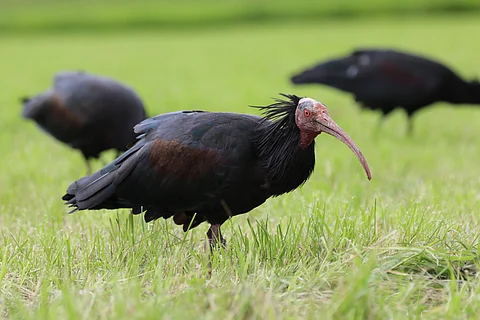
- Destinations
- Experiences
- Stay
- What's new
- Celebrating People
- Responsible Tourism
- CampaignsCampaigns
- SubscribeSubscribe
- Buy Now

For Croatian diver Dorijan Curac, it was the sight of a lifetime. The diver from the town of Bakar chanced upon a strange-looking bird, resembling a heron at first glance, in Grobnicko polje outside the city of Rijeka towards the end of October 2021. He had his doubts though as he mentions in an interview to the web portal morski.hr - and on second checking and a quick search on the internet, he found out that he had made a rather momentous discovery. It turned out the bird was not a heron, but an extremely rare and endangered species the northern bald ibis.
The northern bald ibis is a migratory bird usually spotted in barren, rocky environs close to running water - you are more likely to find them in mountainous cliffs with water bodies than anywhere else. In the 17th and 18th centuries, it nearly became extinct in regions across Europe (including Croatia), and was saved from its fate only in the 21st century thanks to extensive reintroduction programmes (such as the Reason for Hope project). Even then, its numbers are quite low - the reason why it is listed as an endangered species in the IUCN Red List.
Contrary to what the name may suggest, the bird is not born bald. The &lsquobald spot&rsquo develops only once it grows up, which is more than compensated by the long feathers at the back of its neck. Covered by black feathers with a sheen of copper green or purple that glows in sunlight, the northern bald ibis has a red beak and red skin all over its body, except for its bald spot. This 70&ndash80-centimetre- long bird feasts mainly on insects and lizards.
Looking back at Curac&rsquos discovery, there may have been an element of fortuitousness to it. In a Facebook post, Waldrappteam, the charitable organisation spearheading ibis conservation efforts in Europe, mentioned that Nova, the bird in question, may have flown over the Adriatic Sea into Croatia - a route it doesn&rsquot usually take. The organisation alerted Croatian authorities, asking them to protect the bird, also adding that the bird would soon correct its course.
Be it as it may, we could all do with more of these happy happenstances, wouldn&rsquot you agree To stay updated on Waldrappteam&rsquos significant conservation efforts, check out their website and Facebook page.
